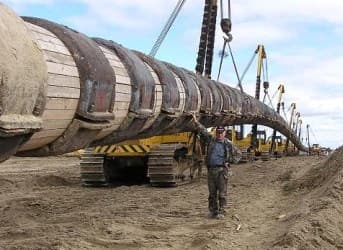Well, its official – the Nabucco pipeline is officially dead. Romania’s national natural gas transit company Transgaz, is convening an Extraordinary General Meeting of Shareholders on 23 September to approve the company severing ties with the Nabucco Gas Pipeline International GmbH Austria consortium and other subsidiary national Nabucco affiliates, allocating a budget of $26.7 million to wind down its involvement.
As Romania was a vital component of the 56-inch, 2,050-mile $11.4 billion Nabucco pipeline, first proposed a decade ago, the handwriting is clearly on the wall now, although the pipeline’s proponents will undoubtedly battle to the bitter end.
So, what finally knocked off one of the West’s most vaunted post-Soviet Caspian projects?
Three things.
Cost, lack of guaranteed throughput, and – the Trans-Anatolian Gas Pipeline (TANAP).
At $11.4 billion, Nabucco, had it been constructed, would have been the most expensive pipeline in the world, more than three times the cost of the 1,042 mile long Baku-Tbilisi-Ceyhan oil pipeline. BTC, which began operations in 2005, is the shining star of Western investment in the Caspian, and now transits nearly 1 million barrels per day of Azeri crude to Turkey’s eastern Mediterranean deep-water terminus at Ceyhan. Raising the billions required for Nabucco would have been a stretch in recession battered European markets.
Related article: No Keystone, No Problem! Canadian Rail Moves to Pick Up the Slack
Furthermore, if Nabucco was built, in order to begin operations it would need to locate sufficient input, as the sole promised volume for its proposed 31 billion cubic meters annual capacity was Azerbaijan's future offshore Caspian Shah Deniz production, which in its first phase of output is estimated at 8 bcm, leaving the pipeline a deficit of roughly 23 bcm. Nabucco boosters accordingly went to work, proposing an under Caspian pipeline to link up at Baku for Turkmen natural gas exports. Unfortunately for Nabucco boosters, China got there first, with the result that in 2012 China received 20 bcm of Turkmen gas, not westward leading pipelines yet to be built. Of course the issue of throughput could easily be resolved if Iranian natural gas was added to Nabucco’s transit options, but this foundered on the political rocks of United Nations and United States sanctions.
But what Nabucco’s supporters are belatedly coming to understand is that what finally decapitated Nabucco was the cheaper, more pragmatic TANAP pipeline alternative.
At a length of 1,240 miles and an estimated cost of $5-7 billion, TANAP was roughly half the length and half the cost of the $11.4 billion 2,050-mile Nabucco pipeline, a not inconsiderable concern in light of straightened European finances. In comparison to nearly a decade of tub-thumping for Nabucco, TANAP has advanced relatively quickly.
Related article: Oil Well, Oil Facilities and Pipelines, New Targets in a New War
In 2011 Turkey and Azerbaijan signed a memorandum of understanding to establish the consortium to build TANAP. In June last year State Oil Company of Azerbaijan (SOCAR) Vice President Suleyman Gasimov told participants at the 19th international conference on Caspian Oil and Gas in Baku, “In view of the Trans-Anatolian Gas Pipeline construction project, SOCAR’s total investments in Turkey may exceed $17 billion.”
Unlike Nabucco, TANAP funding – solved.
Why did Azerbaijan decide to go with TANAP instead of Nabucco? The answers are myriad and complex, but one of the major ones is that Baku simply lost patience with Nabucco supporters, who were long on grandiose visions but short on old, hard cash.
What is certain is that TANAP will fill not only the energy but also political needs of its European customers. One of Europe's most cherished ambitions is to diversify its energy sources and lessen its energy dependency on Russia, as state owned Gazprom now supplies 40 percent of Europe's natural gas imports. Unlike Nabucco, which would have been constructed by a consortium, diluting executive decision-making and prolonging construction times, TANAP will have only two members. Turkey’s Boru Hatlari Ile Petrol Tasima AS state-run oil and gas company (BOTAS) has a 20 percent stake in TANAP, with the rest to be owned by SOCAR.
Accordingly, Romania’s Transgaz decision simply represents political and economic reality, which may finally dawn on even the most diehard Nabucco supporters, who will doubtless be crying into their Moet & Chandon over the imminent loss of the consulting fees.
And the effects of bailing on Transgaz? Analysts are predicting that without the albatross of Nabucco around its neck, its share prices will strengthen. “For this year, we kept the pay-out at 52% as approved by the shareholders through the 2013 budget. Going forward, with no more outflows to Nabucco, we believe an 85% pay-out would be easily attainable.”
Its all about the money.
By. John C.K. Daly of Oilprice.com


















